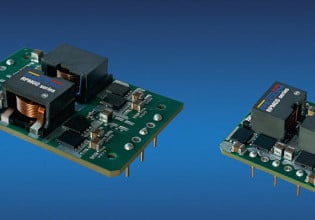Maxim Releases Battery-monitoring IC for Hybrid & Electric Vehicles
Maxim Integrated Products introduced the MAX11068, a high-voltage, 12-cell, battery-monitoring IC for hybrid vehicles, electric vehicles, and any system that stacks long series strings of batteries. The device employs a proprietary SMBus™-laddered communication bus that allows multiple MAX11068s to be daisy chained together without expensive isolators. The company says that this approach reduces battery-management system (BMS) cost by up to 80%, while simplifying battery pack design and precisely balancing cells for maximum energy delivery.
According to Maxim, the IC ffers world-class accuracy, ultra-low power consumption, built-in safety and diagnostic features, and plenty of configurability. The MAX11068 solves the problems associated with safely monitoring large battery stacks and accurately balancing cells. It is well suited for a wide spectrum of battery applications including automotive, industrial, power line, and battery backup.
The MAX11068 is said to greatly simplify the design of high-cell-count battery packs. A 12-cell measurement system, this device employs a capacitor-isolated SMBus-laddered communication bus to minimize component count and cost. This unique architecture allows up to 31 devices to be connected in a series stack to monitor as many as 372 cells. The capacitor-based interface provides extremely low-cost isolation from one bank of batteries to the next, eliminating cascading electrical failures. Maxim’s solution consumes 75% less space than discrete designs.
Maxim said its high-voltage, small-geometry BiCMOS process enables the industry’s highest voltage tolerance (80V), excellent ESD performance (±2kV, Human Body Model), hot-plug capability, and reliable AEC-Q100-compliant performance over a wide temperature range.
The MAX11068’s analog front-end combines a 12-channel voltage-measurement data-acquisition system with a high-voltage, fault-tolerant switch bank input. A high-speed, 12-bit ADC is used to digitize the cell voltages. The MAX11068 employs a two-phase scanning approach to collect cell measurements and correct them for errors. This technique delivers cell-measurement simultaneity, allowing all cell-measurement samples of a 120-cell pack to be co-sited within 10µs. This is said to ensure excellent accuracy in the face of extreme system noise. The MAX11068 delivers less than ±0.25% error over normal battery temperature ranges and ±20mV error over the full AEC-Q100 Type 2 temperature range.
Additionally, the MAX11068 offers a 10x reduction in power consumption (100µA, operating mode) to conserve battery life. A unique built-in shutdown feature reduces consumption to an ultra-low 1µA leakage, allowing the pack to be stored for many years without draining the battery.
The MAX11068 has built-in configuration and self-diagnostic modes, which are crucial for safely monitoring system operation. It delivers faultless operation in the face of harsh magnetic fields and transient noise. Maxim extensively tests the IC using bulk-current-injection, stripline, and in-vehicle testing to ensure glitch-free operation when subjected to the large electrical transients and magnetic fields produced in high-power electric vehicle battery packs. The device has been designed to handle open- and shorted-pin detection and internal block faulty operation per FMEA standards.
The MAX11068 can be paired with the MAX11080 redundant fault monitor to deliver a complete 12-cell solution. Designed to facilitate the transition to carbon-neutral energy solutions, this line of high-voltage devices integrates sophisticated functions to reduce the size, cost, and complexity of battery-management systems. Customers will benefit from enhanced reliability, longer battery life, and accelerated time to market.
The MAX11068 is packaged in a 38-pin TSSOP and is fully specified for operation over the -40 to +105°C AEC-Q100 Type 2 temperature range. Prices start at $8.12 (100-up, FOB USA).






